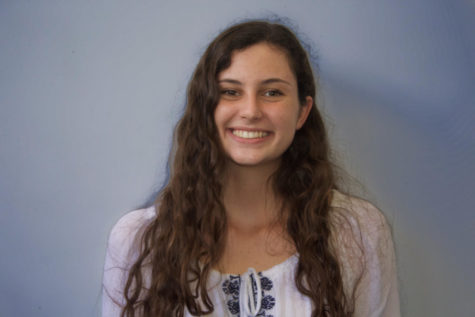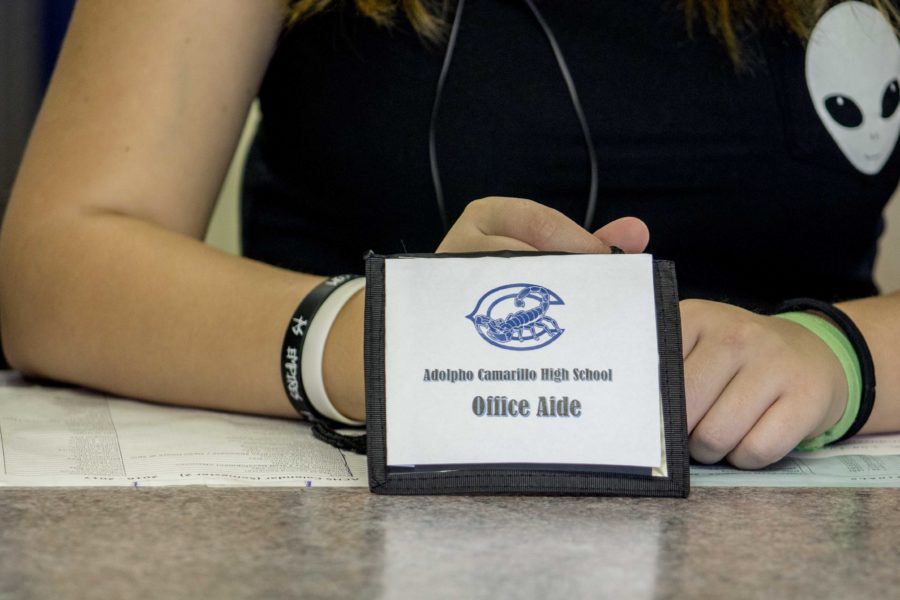New Era for Aiding
Office aide students wear a pass as they send out passes to classes around the school.
As of this school year, office and teacher aides are required to take a Regional Occupational Programs (R.O.P) class in addition to their aiding period to ensure that all classes, including aiding, have a curriculum.
In R.O.P., aides take an online class which covers materials such as educational integrity and teacher and office confidentiality. The assignments are given out to teacher aides once a week either after school, in the morning, or during lunch while office aides meet after school on collegial days from 2 to 3 p.m.
“[Online], we read about the unit and then there is an assignment you type out,” said Wallace Byrd, junior.
Mrs. Michele Sveiven, counselor’s Guidance Technician and the office aid teacher usually assigns one or two units for homework. “It’s not like you have to do it over-night. She gives you a set date when it is due. It’s not a lot though. Time wise, it probably takes like 20 minutes,” Byrd said. According to Byrd, daily aiding duties and online work equally affect aides’ grades.
According to Mrs. Christine Bruggman, Cam High counselor, the amount of students aiding has decreased since the R.O.P requirement’s initiation.
“Normally, [R.O.P.] are classes at the airport. Sometimes, they’re offered at a different high school. This is the first year that the office aide and teacher aide jobs or service classes are under the R.O.P. umbrella and it has changed everything,” said Bruggman.
The district decided that aiding counts for 5 elective credits, 5 less credits than most R.O.P. classes. Next year, however, other R.O.P. classes are being changed into 5 credits, as well. According to Cam High counselor Mr. Tommy Taketa, the reasoning for the discrepancy is unclear. “Counselors at multiple counselors sites have asked the district about [that], but we haven’t gotten a good answer. It’s kind of stonewalled a little bit,” he said.
Sveiven wants her 39 students to gain experience for future job opportunities. “When I was in high school, I worked in the office. I used that on my resume when I went to college and I tried to get a work-study job. I didn’t have to start at the lower-end jobs on campus. I got to start in the bookstore because I already had experience. That’s what I want for all of these kids,” she said.
Junior Isabelle Ortiz chose to aid second semester after dropping her fifth period class. “Right after finals, I knew I didn’t want to take Spanish anymore and that’s when [Ms. Lauri Markson, English teacher] said ‘Oh, I need an aid.’ I aided in seventh grade and I liked it so I figured, why not?” she said.
“This semester is all about how to improve yourself. Once you get a good office job, you want to get a better office job, next time,” Sveiven, said. “They get into technical things like ways to do memos and flyers, things that look good on your resume. You can tell a future employer ‘I already know how to do this,’ so the chances of you getting a better job are really high.”
Ortiz enjoys aiding, especially because she is enrolled in the class she aides for during a different period. “I get to listen to the lectures twice which can be beneficial,” she said.
Sveivan is looking for upperclassmen interested in taking introduction to business class (outside of the business department) next year. The class delves further into management skills learned as an office aide.
Students often choose to aide because they have an empty period which OUHSD now prohibits. All students’ schedules must be consecutive. “It’s a safety and liability issue, as we are a closed campus,” said principal Dr. Kim Stephenson said.
“[If students have periods off in the middle of their day], they have access to leave school and then things happen. They could go off campus and get into a car accident. If you’re here, hopefully you’re safe,” Bruggman said.

Hi! I'm Rachael and I am a senior. As the news editor, I am looking forward to reporting the exciting things our student body and staff will do this...

















































































![Senior Ditch Day... Relaxation or Truancy? [Video]](https://achsstinger.com/wp-content/uploads/2017/10/IMG_7119-900x599.jpg)
![Heavy Rain Hits Cam High [video]](https://achsstinger.com/wp-content/uploads/2017/02/maxresdefault-900x506.jpg)



